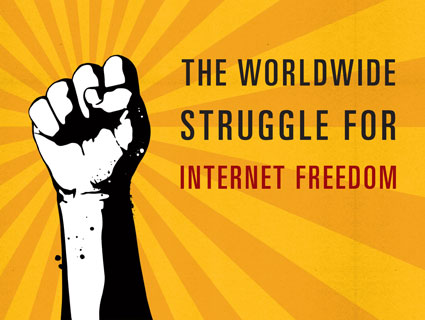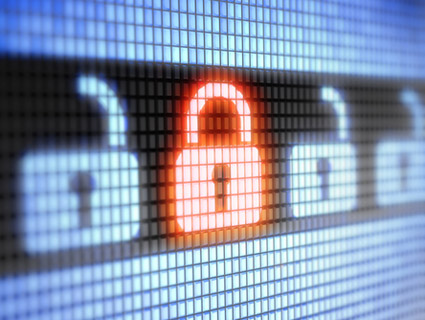
<a href="http://www.brookebready.com">Brooke Bready</a>
Rebecca MacKinnon first began to notice the transformative power of the internet as a journalist for CNN in Beijing and Tokyo in the late ’90s and early aughts. Then, as a scholar at Harvard’s Berkman Center for Internet and Society, she began to take a closer look at the trends she’d spotted in the field, and realized that the rise of the internet has major consequences not just for journalism, but for geopolitics. Her just-released book on politics and power in the internet age, Consent of the Networked: The Worldwide Struggle for Internet Freedom, couldn’t have come at a better time. Fresh off the SOPA/PIPA battle, Americans may be starting to see the web in a newly political light. MacKinnon chatted with us about the aftermath of that fight, the recent “Twitter censorship” scandal, and whether we’re in danger of being “entertained to death.”
Mother Jones: Let’s start with SOPA/PIPA. The narrative so far has been that the Internet beat Big Hollywood and Big Brother, but it seems a bit more complicated. Could this be a moment where people become aware of the Internet as a political terrain in and of itself, rather than just a battleground for other issues?
Rebecca MacKinnon: I think this has the potential to be a watershed moment, but it’s still unclear. This SOPA/PIPA movement was such a convergence of different factors, where the interests of the Internet companies and the human rights groups and the civil liberties groups and Internet users and a lot of international actors were kind of aligned, so it was one of those moments where it was really easy to have a successful movement. But there are a lot of other issues where they aren’t so aligned. With privacy issues, for instance, or, say, net neutrality, where different companies have different interests depending on what their product or service is and where they fit in the whole chain of information flows. The other thing about the SOPA/PIPA movement is that you had a convergence of grassroots groups on both the left and right-wing sides. You had the tea partiers, the progressives, left-wing people, libertarians—everyone was together on this. And there are other issues—say, when it comes to the Patriot Act or surveillance—where it gets much more ideological and people are much more divided.
MJ: What do you think comes next?
RM: The force and the unity of what happened around SOPA/PIPA was unusual and will be hard to duplicate, but I think it really did highlight to people how much these laws being passed in Washington do actually affect what we can do with the Internet, what we can do with our technologies, and how that affects our daily lives…I don’t think we can just assume that now everybody’s just awake and it’s a new era and we can just sit back and cruise, but people are much more aware now than they were just a year ago that the Internet is a contested space and we have to be aware of how people are trying to shape it, be they companies or governments, or other actors, and we need to pay attention and get engaged and involved. That’s quite striking. The battle’s not won, but it’s a huge step forward…and I know a number of groups who work on freedom of expression and freedom of speech issues and internet openness issues are hoping to keep pushing on these issues and keep galvanizing people.
MJ: With SOPA, a lot of people were worked up about government censorship, that kind of 1984 blacking-out-your-internet kind of thing. But a lot of the really worrisome stuff is more subtle, where there’s no specter of Big Brother coming to take away your internet but you end up losing access and freedoms and so on.
RM: When you go to China, you talk to a lot of middle class people who aren’t very political—because most people in most countries aren’t very political unless they get riled up about something—and people are like, all these Americans are going on about how unfree we are, and how repressive our country is, but I can do all this stuff on the internet! I’m doing this, that, and the other, I feel free! I don’t feel oppressed! What are these people talking about? These Americans are just anti-Chinese, they’re just making stuff up. Because from their experience, they don’t feel so unfree. This is why I called the Chinese model “networked authoritarianism,” because people do have more give-and-take with the government, they have more freedom than they used to, but it still has limits.
I think in democracies we’re kind of socialized to assume that all the authoritarian countries will eventually evolve and become more like the democracies, and that the Internet will make that more likely, but another possibility is that the authoritarian countries become more like democracies in terms of more public discourse and freewheeling space on the Internet, but it meets in the middle with democracies becoming less free and more manipulated, so we all just become more the same.
MJ: It’s easier to mobilize against that direct oppression, though, than against the subtler kinds—how do you deal with that?
RM: Yes, it’s much easier to mobilize against that kind of Orwellian thing than it is against Huxley’s sort of, everybody’s entertained to death, where everything is so entertaining and so convenient, and everybody’s so occupied that they don’t really notice or realize what has been constrained, and they’re not aware of the people who are being silenced. And that’s the most insidious…The way I think liberties get eroded is not that all of a sudden you become an Orwellian state, but gradually it becomes harder for people with unpopular views to speak out without being in danger, be it from the state or just from the majority of the people who don’t like them. It becomes more risky for at-risk people to express themselves; it becomes more difficult for people to express themselves. You have this erosion at the edges and you need to be looking at the canaries in the coal mine, so to speak.
Can the woman who’s fleeing her abusive spouse have a space to speak out, and to gather support without being hounded? Can people still speak out against a law that they want to change without being so threatened that they can’t even speak? Those are sort of the questions we need to be asking when we’re asking how our internet services and platforms are shaped. Can the nonprofit activist group that’s trying to get their videos out—if they can’t post them, for whatever reason, on Google’s platform, can they still get them out? Can they get their message out, or will the services used to access the Internet discriminate so much in favor of some services over others that it’ll be hard for it to gain a foothold? So it’s the subtle things I think we need to be looking at a lot of times rather than, oh, all of a sudden we’re going to turn into China. We’re not going to turn into China, but there are a lot of things that could take us in that direction ever so subtly, and over time that adds up.
MJ: The question of whether we have real choices seems to be a big one. Facebook seems to be trying to become the portal people use to access everything online—music, news, whatever. And then it’s to everyone’s benefit to be on the same social networking site—but that also makes those companies much more powerful. What are the risks there, and how can we mitigate them?
RM: Right. Everyone benefits from the network effect, and that’s what makes those companies useful, but that’s also what makes them scary. And that’s why it’s so important that the people running these platforms understand the implications of what they’re doing and the choices they’re making, and understand the impact they are ultimately having on the future of democracy and the future of a liberal pluralist society. They may feel they’re a neutral platform and they’re not political, but the reality is that they are having an impact on how people can organize and interact, and on what they feel safe doing and what they don’t feel safe doing, and how trustful they are and how untrustful they are of the people around them. And it affects the entire sociopolitical environment we live in—that’s just a fact. They may not have intended it to become that way, but that is how it’s become. And they have responsibilities that they cannot shirk.
I also think companies should be doing a better job of reaching out to different groups of users that they know are using their sites—not just people who have the attitude of “I have nothing to hide, so who cares?” but people who really do have security and privacy concerns. Or they should be much more upfront and honest with the public about how their services should be used, and stop encouraging people to use those services for campaigning and activism when there’s a significant percentage of people who just can’t afford, for security and privacy reasons, to be on Facebook.
And I think those of us who use these sites can be much more proactive in organizing—I have this idea that we should have a global association of Google users, with different chapters around the world and people who voice concerns and have meetings a couple of times a year with Google execs with ideas about what’s not working, what’s endangering people and so on…It’s sort of a hybrid between consumer activism and labor activism that might be called for, new forms of activism that we need to develop in order to deal with this new form of sovereignty. But you know, we’re still in very early stages of working out—I think people are just coming to realize how much power is being exercised. We’re kind of in these early days where people across the spectrum are needing to find new ways to develop legitimacy and credibility and trust, which is so lacking in so many parts of our society today, not just the internet.
MJ: The new digital divide is really troubling, where some services that are targeted at a particular set of users are really dangerous for other users. Does that present a problem to internet advocacy? How can we overcome that divide?
RM: There are definitely organizations that are trying to work on that and call attention to this. There’s one called the Association for Progressive Communications, with headquarters in South Africa, and they work on a lot of these developing world questions. They’re involved in a lot of international policy forums, and increasingly they’re involved in trying to get engineers who are setting the standards for this technology to set the standards for people who are at risk.
Up until a couple of years ago, most of the human rights community wasn’t really thinking about these issues at all, or about technology—the shape of technology, and the management of technology, and what that means for human rights. There’s this organization called Human Rights First that works with people in DC and all over the world, and they’ve started to engage with some of the global cell phone carriers like Vodafone—Vodafone does business in Egypt, and the Egyptian government made them shut down their service last year with everyone else and send out manipulative text messages that were basically lies. So Human Rights First has been working with companies like Vodafone to say, not only “How do you interact with governments?” but “How do you structure your technologies so you’re not putting vulnerable people at risk? And not just serving as an extension of state power?”
Because there’s the human rights reason why that’s bad, but also there’s the issue that ultimately that if people don’t trust these companies, that’s very bad for their business in the long run. And because of what Vodafone did in Egypt, they lost business in a lot of other countries from people who read about it and said, “Yuck!” People associate ethical or unethical behavior with them and make choices accordingly…I think it’s pretty clear that not only will their reputations be affected if they don’t do this, but that they can create a lot of positive value and win trust if they get out ahead of this and say, “Look, we’re more trustworthy, we’re doing more to protect your rights than these other guys. Use us, not them.”
MJ: Which brings me to the Twitter censorship brouhaha, which I think I actually heard about on Twitter—everyone was castigating Twitter for supposedly caving to oppressive governments, but then a few people made the argument that actually these policies aren’t so bad, and Twitter is actually doing a good job of being transparent about them. What do you think?
RM: Yeah, with Twitter I think there’s more to it than there seems to be. They’ve taken a huge hit, but they’re not going to be responding to Chinese government requests to censor tweets, or Iranian or Syrian requests. They’re trying to operate in the UK, and setting up offices in Brazil and Germany and France and places where, say, in Germany neo-Nazi speech is illegal, and Britain has really strict libel laws, and Brazil has its own funky laws about libel and defamation and so on. And so they want to be able to respond to government requests in a specific jurisdiction and block tweets if you’re in that jurisdiction but have them available to everyone else in the world. But it’s my understanding that they’ll only do this in democratic countries that have due process, and they’ll link to the government order, so if people don’t like the government’s law on that they can ostensibly get it changed. It’s not meant for places like China where nobody can do anything about it and the rules are arbitrary and broad and political…so this is not global censorship; people are kind of overreacting.
MJ: Larry Lessig’s been a big defender of Internet freedom, but he’s now working full-time on campaign finance reform—what do you think about that decision to focus more broadly on corporate power and corruption?
RM: Well, I definitely agree that we need campaign finance reform—we have a problem more broadly, but certainly with laws related to the Internet and anything related to copyright, it’s just so subject to lobbyist capture. You could say we just need to get Google and Facebook and Microsoft to lobby more, but I don’t think that’s a solution—the point of a democracy is that government’s supposed to be accountable to the people.
















